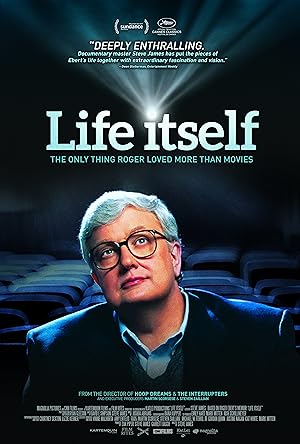
Life Itself Page #4
as if he were sitting
in the 15th row,
taking notes with one hand
and eating popcorn with the other.
But he didn't simplify things.
It envelops us in a red membrane
of passion and fear.
And in some way that
I do not fully understand,
it employs taboos and ancient
superstitions to make its effect.
I think the way
that he writes,
that sort of clear, plain,
Midwestern newspaper style,
conveys enormous intelligence,
encyclopedic learning,
but doesn't condescend,
doesn't pander.
Roger would become the definitive
mainstream film critic
in American letters.
He made it possible
for a bigger audience,
a wider audience to appreciate
cinema as an art form.
Really, really loved films,
and he did not get caught up
in certain ideologies
about what cinema should be.
After he won the Pulitzer,
if he had a mind
to go to The New York Times,
he could've done that,
The Boston Globe,
The LA Times, no problem.
Ben Bradley, editor
of The Washington Post,
of Watergate fame,
went after Roger hard.
Offered him the sun and the moon.
Ebert just kept saying no.
He said, "I'm not gonna
learn new streets..."
...which is very Ebert-like.
The Sun-Times
So many regimes.
The Murdoch era
which had crashed the paper.
So many people left.
"I'm not gonna run away."
- Right.
- These are my colleagues
and not everybody
can get another job.
If someone went across the street
for a job, they were selling out.
You didn't even say
the Tribune.
You'd just say
went across the street.
It was a huge clash
in political difference
between the Sun-Times
and the Tribune.
We were a working class paper.
And we reached
the black community.
The Tribune was
a very wealthy paper.
I mean, look at the Tribune tower.
This huge gothic structure
studded at its base
with all the great art works
of the world.
You know, here is part
of the pyramid of Giza.
And you're thinking, what?
Did the Tribune guy go out with
a chisel and steal this thing?
From the day
the Chicago Tribune
made Gene Siskel
its film critic,
we were professional enemies.
For the first five years
we knew one another,
Siskel and I hardly spoke.
When Gene and I were asked
to work together on a TV show,
we both said we'd
rather do it with someone else.
Anyone else.
The name of our show is Opening
Soon at a Theatre Near You,
two film critics
talking about the movies.
And this is Roger Ebert
from the Chicago Sun-Times.
And right over here
is Gene Siskel
from the Chicago Tribune
and Channel 2 news.
Gene and Roger
were sitting kind of pinioned,
in director's chairs,
looking into the camera
very seriously,
talking about the movie.
One Flew Over the Cuckoo's Nest
just had the audience
tearing up the seats with joy.
Yeah, and also, tearing up a little
my enjoyment of the film.
They were applauding
even during the credits...
It was stiff, and wooden.
But when Foreman backs up and tries
to make his big points
about the establishment
and authority...
But there was
something there.
It was interesting
to hear two people
who knew what they were talking
about, talk about a movie.
Bremen Freedom
by Rainer Werner Fassbinder,
one of the new generation
of West German directors...
Roger loved the idea of
being on public television.
He had been on it before
on a show where he introduced
films by Ingmar Bergman.
It was awful.
And in this movie
his name is Spegel,
which is Swedish for "mirror."
It was a deer caught
in the headlights.
What is real
and what is illusion,
and who's being fooled
by the art?
Is it the artist,
or his audience, or both?
And the movie's ending,
a confrontation
with the heavyweight champion
of the world...
Roger needed to learn
how to write for television.
...emotionally fulfilling scenes
I've seen in a long time.
To keep sentences short.
He would get irritated
and he would say,
"Thea, I have a Pulitzer Prize."
And I would say to him,
"Roger, I know that,
but that doesn't mean you know
how to write for television."
And right through that last scene
I was really loving Taxi Driver,
because up until that point,
the relationship between
De Niro and Cybill Shepherd
has been electric...
Gene was a natural.
He was one of these people,
he could talk to the camera.
He had a huge
handlebar mustache.
And so I just said,
"That is a funny looking thing
on your face, get rid of it."
I thought, these two guys
would never be on television.
These are unusual,
odd-looking characters
for the medium, TV,
that's all beautifully quaffed,
and beautiful teeth,
and everything's fine.
And they dressed
like a couple of clowns
if they wore
these outfits today.
You couldn't make Siskel and Ebert
if you were Dr. Frankenstein.
I think in the beginning
it was very difficult.
Gene sat in the back row,
Roger had his favorite seat.
They left without saying
a word to one another.
We both thought of ourselves
as full service,
one-stop film critics.
We didn't see why
the other one was necessary.
Alone together in an elevator,
we would study the numbers
changing above the door.
Their lifestyles couldn't have
been more different.
Roger was single.
He was an only child.
Gene, in childhood,
lost both his parents,
one after the other.
He was a philosophy major
at Yale.
While Roger was, you know,
one of the good old boy
news reporters.
Gene just was more of a...
for lack of a better word,
elegant character.
He caught the eye of Hugh Hefner,
and he was adopted
by the clan at the mansion.
And he traveled with Hefner
in the Bunny Jet.
Beyond the Valley of the Dolls,
for a while.
The perfect matching
of opposites, Siskel and Ebert,
Laurel and Hardy,
Oscar and Felix,
really made Sneak Previews
And how Roger and I go to the movies
as critics is the subject
of this special take two program
on Sneak Previews.
- Hi, Gene.
- Hi, Roger.
In every theater I have
a favorite seat I like to sit in.
In the last row,
sort of off to the side.
Not just kind of reading
or speaking criticism,
I always choose a seat
that's twice as far back
from the screen
as the screen is wide.
Then you must make
a friend of horror.
Horror and moral terror.
I think we can
save ourselves a lot of time
that although I think
the last half hour works,
I doubt if I can ever
convince you of that,
and that the first
two hours of the film
consist of some of the most
beautiful, heartbreaking, tragic,
memorable footage of war
that I've ever seen.
I think that you can show almost
anything to do with Vietnam,
and people feel,
"Oh, my God, the human waste."
Translation
Translate and read this script in other languages:
Select another language:
- - Select -
- 简体中文 (Chinese - Simplified)
- 繁體中文 (Chinese - Traditional)
- Español (Spanish)
- Esperanto (Esperanto)
- 日本語 (Japanese)
- Português (Portuguese)
- Deutsch (German)
- العربية (Arabic)
- Français (French)
- Русский (Russian)
- ಕನ್ನಡ (Kannada)
- 한국어 (Korean)
- עברית (Hebrew)
- Gaeilge (Irish)
- Українська (Ukrainian)
- اردو (Urdu)
- Magyar (Hungarian)
- मानक हिन्दी (Hindi)
- Indonesia (Indonesian)
- Italiano (Italian)
- தமிழ் (Tamil)
- Türkçe (Turkish)
- తెలుగు (Telugu)
- ภาษาไทย (Thai)
- Tiếng Việt (Vietnamese)
- Čeština (Czech)
- Polski (Polish)
- Bahasa Indonesia (Indonesian)
- Românește (Romanian)
- Nederlands (Dutch)
- Ελληνικά (Greek)
- Latinum (Latin)
- Svenska (Swedish)
- Dansk (Danish)
- Suomi (Finnish)
- فارسی (Persian)
- ייִדיש (Yiddish)
- հայերեն (Armenian)
- Norsk (Norwegian)
- English (English)
Citation
Use the citation below to add this screenplay to your bibliography:
Style:MLAChicagoAPA
"Life Itself" Scripts.com. STANDS4 LLC, 2025. Web. 4 Mar. 2025. <https://www.scripts.com/script/life_itself_12550>.







Discuss this script with the community:
Report Comment
We're doing our best to make sure our content is useful, accurate and safe.
If by any chance you spot an inappropriate comment while navigating through our website please use this form to let us know, and we'll take care of it shortly.
Attachment
You need to be logged in to favorite.
Log In